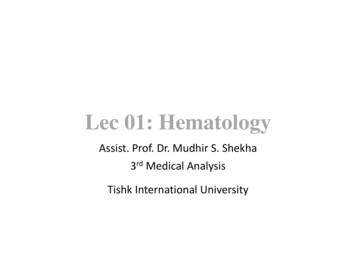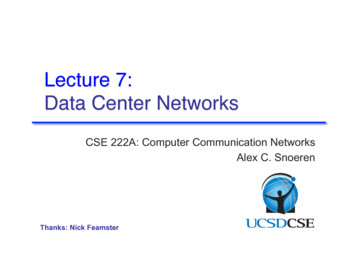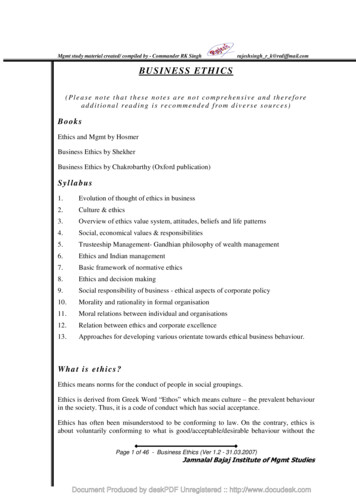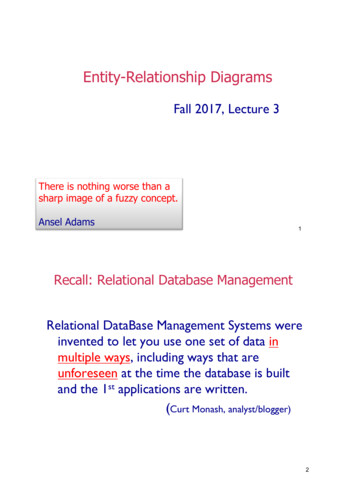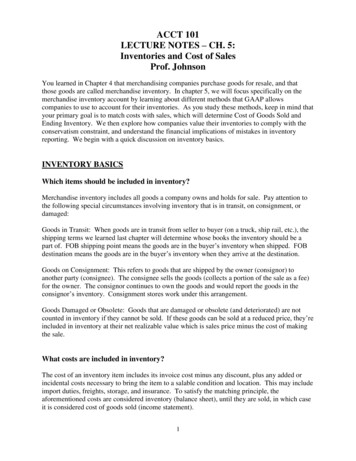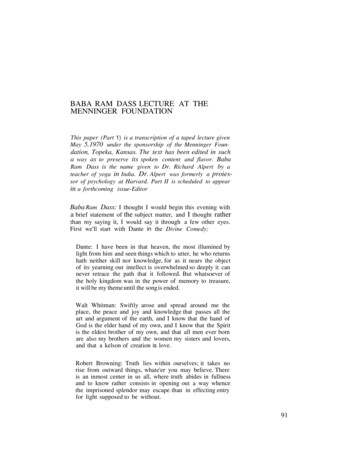
Transcription
BABA RAM DASS LECTURE AT THEMENNINGER FOUNDATIONThis paper (Part 1) is a transcription of a taped lecture givenMay 5,1970 under the sponsorship of the Menninger Foun-dation, Topeka, Kansas. The text has been edited in sucha way as to preserve its spoken content and flavor. BabaRam Dass is the name given to Dr. Richard Alpert by ateacher of yoga in India. Dr. Alpert was formerly a proiessor of psychology at Harvard. Part II is scheduled to appearin a forthcoming issue-EditorBaba Ram Dass: I thought I would begin this evening witha brief statement of the subject matter, and I thought ratherthan my saying it, I would say it through a few other eyes.First we'll start with Dante in the Divine Comedy;Dante: I have been in that heaven, the most illumined bylight from him and seen things which to utter, he who returnshath neither skill nor knowledge, for as it nears the objectof its yearning our intellect is overwhelmed so deeply it cannever retrace the path that it followed. But whatsoever ofthe holy kingdom was in the power of memory to treasure,it will be my theme until the song is ended.Walt Whitman: Swiftly arose and spread around me theplace, the peace and joy and knowledge that passes all theart and argument of the earth, and I know that the hand ofGod is the elder hand of my own, and I know that the Spiritis the eldest brother of my own, and that all men ever bornare also my brothers and the women my sisters and lovers,and that a kelson of creation is love.Robert Browning: Truth lies within ourselves; it takes norise from outward things, whate'er you may believe. Thereis an inmost center in us all, where truth abides in fullnessand to know rather consists in opening out a way whencethe imprisoned splendor may escape than in effecting entryfor light supposed to be without.91
Ralph Waldo Emerson: A man is the facade of a templewherein all wisdom and all good abide. What we commonlycall man, the eating, drinking, counting, planting man, doesnot as we know him represent himself, but misrepresentshimself.path ofconsciousnesscyclic nature ofspiritual journeyfour componentdesign of ashram:firstpart92Last evening, here in Topeka, as one of the journeyers ona path, a very, very old path, the path of consciousness, I,in a sense, met with the Explorers Club to tell about thegeography I had been mapping. The people who gather tohear somebody called Baba Ram Dass, formerly RichardAlpert, have somewhere, at some level, in some remote corner, some involvement in this journey. All that I can seethat we can do with one another is share notes of our exploration. I can say, "Watch out, because around that bendthe road falls off sharply to the left . . . stay far over on theright when you do that."The motivation for doing this is most interesting-it's onlyto work on myself. It's very easy to break attachments towordly games when you're sitting in a cave in the Himalayas.It's quite a different take you do of sex, power, money, fame,and sensual gratification in the middle of New York City inthe United States with television and loving people aroundand great cooks and advertising and total support for all of theattachments. But there is the story of a monk who got veryholy up on the mountain until he had some thousands offollowers. After many years he went down into a city andhe was in the town and somebody jostled him. He turnedaround angrily and that anger was a mark of how littlework he had really done on himself. For all the work hehad done he still hadn't clipped the seed of anger; be stillgot uptight when somebody pushed him around. So that whatI see as my own sadhana (my work on my own consciousness-it could also be called my spiritual journey) isthat it is very much cyclic. There are periods of going outand there are periods of turning back in, periods of goingout and periods of going back in. Just as living here in themarket place is forcing things into the forefront, so sittingin a room by myself for 30 or 40 days in a mountain isforcing other things to be confronted. Each hides from theother, each environment hides from the other sets of stimulusconditions. For example, in the commune we've been designing up in the mountains of New Mexico, where I fanan ashram for awhile this winter, the design has four components to it which are roughly related to the solstices. Forone period, a person would be in the hermitage on the top
of the hill where he would be going deep-diving deepwithin. He would be totally alone in solitude in a hermitage.The food is left outside the door. In the one I ran thiswinter, the people would go in for up to 19 days. The firsttime they went in I let them take books and pictures andweaving and all of their things (their pet kind of creamcheese or whatever it was they needed). For the secondround we changed the game a little and all they took inwas their sleeping bag. They walked into a room, closedthe door, and for the next 10 days, fire and wood and foodwere left outside and there was a jug of water. They wereall protected, all taken care of. There were no phones toanswer, no mail. We were protecting them and giving themthat chance to get free of all the stimuli that keep capturingconsciousness all the time so that one keeps saying, "If itweren't for . " Well, we did that. We created that place.A second part of the four-point cycle is that a person livesin a commune, an ashramite lives in the commune . . thatis, he takes care of the gardens, the babies, the goats, cooksthe food, chops the wood, does Karma Yoga. That is, KarmaYoga among what's called satsang or sangha, that is, a community of other beings who consciously know they are working on their own consciousness. In Buddhism there is a traditional thing you do which is to take the three refuges. Thereis a chant, which means, first, "I take refuge in the Buddha,"I take refuge in the fact that a being can become enlightened,that is, a being can get free of any particular state of consciousness (attachment) . Second, "I take refuge in theDharma," I take refuge in the law, in the organization ofthe universe, the laws of the universe, you can also call itkarma. And third, "I take refuge in the Sangha," in thecommunity of other people, of monks on the path, the community of other people who are seeking. Thus, when youdefine yourself as a seeker after sensual gratification thenyou surround yourself with other people who are seekersafter sensual gratification. When you define yourself as anintellectual you often surround yourself with intellectuals.When you define yourself as a seeker after consciousness,you start to surround yourself with other seekers after consciousness, because in that phase being around such peoplereally gives you a kind of environmental support.It's like . take the matter of consecrating life actions . . .what I mean by the word consecration is bringing into consciousness the nature of the act in a cosmic plan. For example, in the old days people would say grace. Grace wassecond partof ashramcyclethree refugesof Buddhismeffect ofself-definitionnatureoiconsecration93
a thing you waited for before you ate the turkey. NormanRockwell characterizes the kid reaching while everybody'shead's bowed. It's that time, "Let's say grace." "Grace."Now, when I bless food, the statement I say, when I saygrace, is an old Sanskrit one. It means "This offering ofthis . this little ritual I'm performing, this is part of it all,part of Brahma, part of that which is eternally all. He whois making the offering means, that which is being offered ispart of it all. The hunger to which you are feeding . . . thefire which you are feeding, that's all part of it all. Whoeveryou are offering it to is part of it all, too. He who realizesthat all of it is interrelated, all of it is one, becomes one withit al1. 'There is a very lovely short story by J. D. Salinger calledTeddy, in which Teddy is a very . he's like an old lamawho's taken a reincarnation in a kind of middle class westernfamily by some quirk of cosmic design. He is about 10 yearsold and on a ship with his sister and his mother and father.He's out on deck and he's meeting this man who has begunto see that this little boy isn't quite like a little boy, and hesays to him, "When did you first realize that you . . . how itwas?" And Teddy says, "Well, I was 6 years old. I was inthe kitchen and I was watching my little sister in her highchair drink milk. I suddenly saw, that it was sort of likeGod pouring God into God, if you know what I mean."Well, that's exactly the same thing as that Sanskrit mantra.You're pouring energy into energy for a matter of energyin honoring energy. So big deal, so nothing's happened.Certainly knocks a hole in orality to start to see the universethat way. What are we doing? Nothing. How could you everdo anything, it's all here? Are we all here? Sure. So in learning how to consecrate and so on it is helpful to have peoplearound.It is part of my karma to be visiting my father who is a73 year old a Republican from Boston, a conservativeman, and a very successful man in the society. When we sitdown to the table, he starts to eat and then he looks over andhe sees that I'm doing this "thing" which I do quietly, I'mnot coming on about it. I'm just sort of sitting quietly . . .and he'll hold his spoon in mid-air and he'll go, "pht.' It'salmost an involuntary thing that comes out. It's like, O.K.,I'll wait for the kid . . . it's his meshuggeneh thing. Nowthat's not satsang, that is, that is not the community ofmonks on the path. And that "pht," whether that helps meor hinders me is a function of where I'm at, really. Inother words, if I am into what I'm doing strongly enough,94
all that that "pht" does is arouse a feeling of poignancyabout our predicament, but it doesn't in any way deter fromthe amount of the living, vibrant quality I can invest in thething I'm doing.I go to church now and then around the United States andwe sing hymns that are mind-blowers. They are all hymnsthat get you "high." They were written by people in ecstaticstates and you read them . everybody's singing them likethey're reading the shopping list. There's no spirit, the spiritisn't invested in any way in the singing and yet whoeverwrote it invested the spirit. We say, "WeU, they were naive."What we mean is that we are turned off. When Christ says,"Look, I am making all things new," it's the same as whenyou're really living here and now and every moment is allfresh and that hymn . . . it's like the first time you everheard it and you really go out on it. Otherwise, what did yougo to church for?The third part of the ashram cycle is where a member of thecommunity goes into the city, society, and pursues whatBuddha calls "right livelihood," that is, he raises the breadfor the commune. I once was with a group of ex-convictswho had started a commune up in the mountains outsideof Los Angeles. There were about a hundred of them andthey would break into groups of eight and lie out in thewoods with their heads touching and all take LSD withtheir wives and children. They had quite a powerful community and they were wondering what to do . . . becauseafter a certain point of working inside you begin to feel thepull of service, the pull of sharing or serving. It's like akarmic predicament you're in . . . you can only collect somuch before you have to hand it over, spread it out, andthen you can go back inside. And so, they asked me whatto do and I said why didn't they open a shop in LagunaBeach, which they did. It is now a fantastically successfulshop where they make the crafts up in the hills and shipthem in. That whole process is one of building these differentparts of ourselves, and people rotate through these variousscenes.The fourth component is visiting other ways of achievingconsciousness. For example, I've been working with theBenedictine monks at a monastery to start work on an exchange program with ashrams in India, with growth centers,with the Hassids, and with the Sufis. Another example, thisevening is the last formal lecture or discussion that I aminvestmentof spiritthird part ofashram cyclefourth partof ashram cycle9S
doing your ownbeingconsciousness asfreedom fromattachmentgoing to be giving in the United States on this round, in thisincarnation, I hope. (That's only an attachment too, ofcourse.) I'm about to leave and I'm going back into trainingnow because I'm a beginner. I realize I'm really like thewater boy on the team so I'm cashing in the chips and goingback into the jungle. However, the first thing I'm going todo is go to South America to a Sufi training program. TheSufis are the mystic wing of the Moslem religion. You knowthem, perhaps, as the whirling dervishes. That's only oneaspect of them. Gurdjieff was trained in the Sufi tradition,primarily. After that . I'll go back to India. Now theseare the kinds of things I'm talking about as the fourth stage.So, what I'm saying is that this evening is part of my workon myself because I realize that the only thing you have tooffer to another human being, ever, is your own state ofbeing. You can cop out only just so long, saying I've got allthis fine coat-J oseph's coat of many colors-l know all thisand I can do aU this. But everything you do, whether you'recooking food or doing therapy or being a student or being alover, you are only doing your own being, you're onlymanifesting how evolved a consciousness you are. That'swhat you're doing with another human being. That's theonly dance there is! When you're protesting against somebody, the degree of consciousness with which you're protesting determines how well they can hear what it is you'rereally saying. And consciousness does not mean attachmentto polarity, at any level. It means freedom from attachment.And once you see that the highest mother is the mother whois the most conscious mother, the highest student, the highesttherapist, the highest lover, the highest anything is the m
Ram Dass is the name given to Dr. Richard Alpert by a teacher of yoga in India. Dr. Alpert was formerly a proies sor of psychology at Harvard. Part II is scheduled to appear in a forthcoming issue-Editor BabaRam Dass: I thought I would begin this evening with a brief statement of the subject matter, and I thought rather than my saying it, I would say it through a few other eyes. First we'll .






